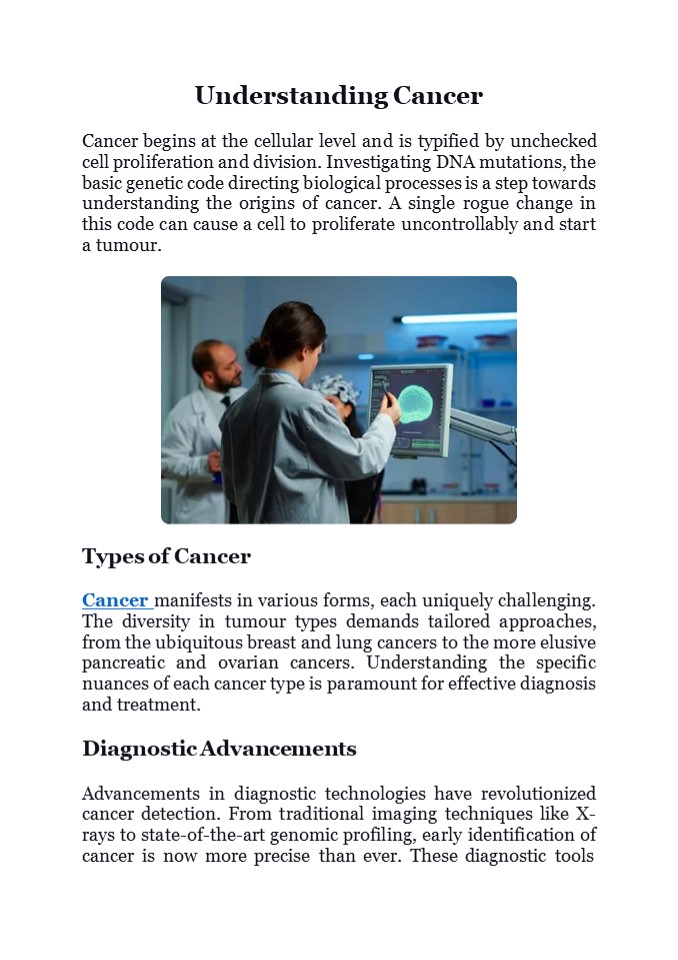Understanding Cancer - PowerPoint PPT Presentation
Title:
Understanding Cancer
Description:
Plunes HealthCare can help you find top hospitals, experienced doctors, and the best cancer treatment options in Delhi if you want cancer treatment. We aim to provide you with the best care and consideration for your needs. Call us at 7011311900 if you would like customised guidance. – PowerPoint PPT presentation
Number of Views:2
Slides: 4
Provided by:
Username withheld or not provided
Category:
Medicine, Science & Technology
Tags:
Title: Understanding Cancer
1
Understanding Cancer Cancer begins at the
cellular level and is typified by unchecked cell
proliferation and division. Investigating DNA
mutations, the basic genetic code directing
biological processes is a step towards
understanding the origins of cancer. A single
rogue change in this code can cause a cell to
proliferate uncontrollably and start a tumour.
Types of Cancer Cancer manifests in various
forms, each uniquely challenging. The diversity
in tumour types demands tailored approaches,
from the ubiquitous breast and lung cancers to
the more elusive pancreatic and ovarian cancers.
Understanding the specific nuances of each
cancer type is paramount for effective diagnosis
and treatment. Diagnostic Advancements Advanceme
nts in diagnostic technologies have
revolutionized cancer detection. From
traditional imaging techniques like X- rays to
state-of-the-art genomic profiling, early
identification of cancer is now more precise
than ever. These diagnostic tools
2
empower healthcare professionals to intervene
proactively, significantly impacting patient
outcomes. Staging and Grading Staging and
grading systems classify the extent and
aggressiveness of cancer. Staging determines the
spread of cancer within the body, guiding
treatment decisions. Grading assesses the degree
of abnormality in cancer cells, aiding in
predicting its behaviour. This meticulous mapping
of the cancer terrain informs clinicians and
patients alike, shaping the course of
treatment. Treatment Modalities The arsenal
against cancer spans a spectrum of treatment
modalities. Surgery, chemotherapy, radiation
therapy, immunotherapy, and targeted therapy
form the backbone of cancer interventions.
Combinations of these modalities, tailored to
individual cases, maximize efficacy while
minimizing adverse effects. Research
Frontiers In the relentless pursuit of
conquering cancer, research remains at the
forefront. Investigating novel therapies,
deciphering the molecular intricacies of
tumours, and exploring immunological
breakthroughs define the current research
frontiers. The collaborative efforts of
scientists, clinicians, and pharmaceutical
innovators propel us closer to a future where
cancer is treatable and preventable. Conclusion
This comprehensive overview scratches the
surface of the vast landscape that is cancer. As
we continue to delve into its complexities,
armed with knowledge and innovation, the
3
collective effort to redefine the narrative of
cancer treatment gains momentum. Stay informed,
stay vigilant, and join the global mission to
transform the future of cancer care.































